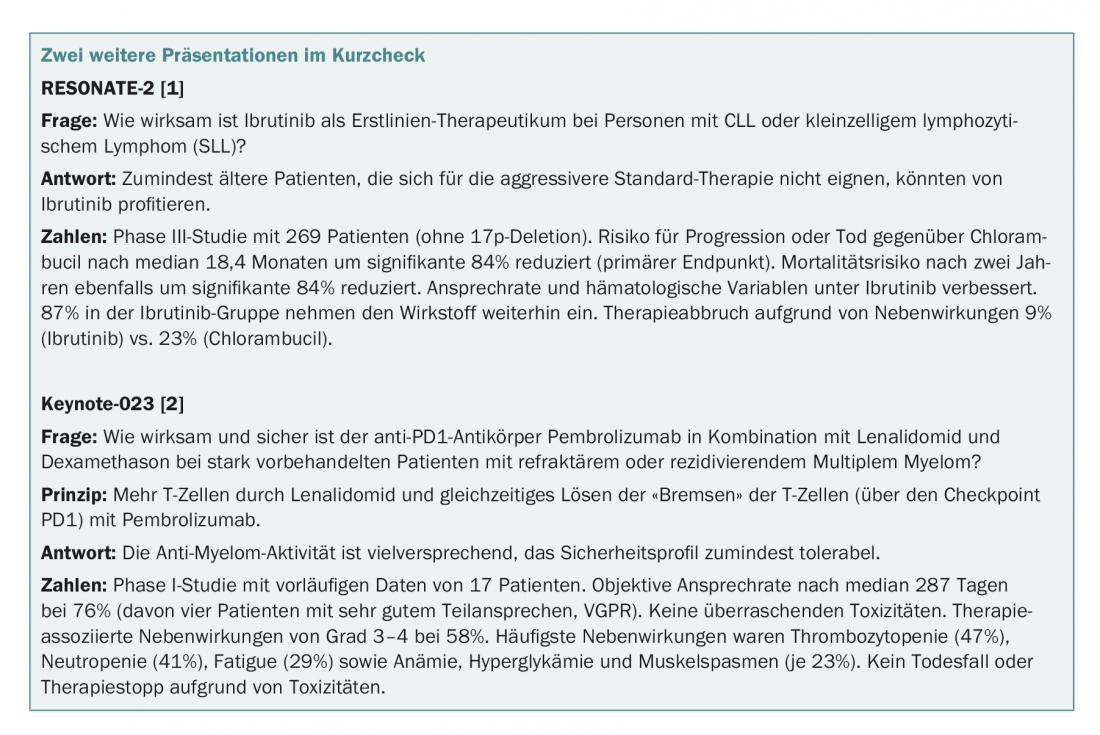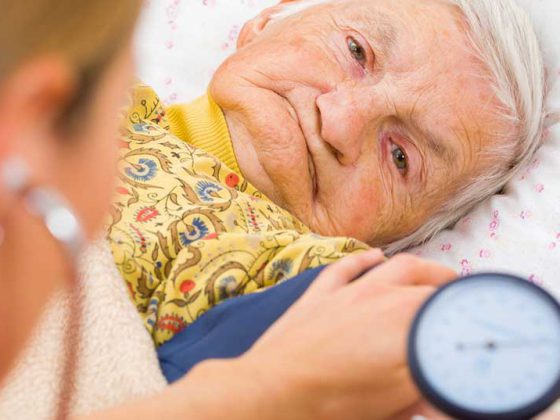The ASH Congress was held last year in Orlando. This time, one of the topics was the efficacy of rituximab in adult patients with B-precursor acute lymphoblastic leukemia (ALL). Up to 50% of affected individuals express CD20 and thus could benefit from the anti-CD20 antibody. Furthermore, therapy with modified T cells continues to be promising. Apparently, these lead to a rapid and long response even in a heavily pretreated collective where other therapeutic options are of little help. Last but not least, the results of the SWOG S0777 trial were also in focus, highlighting the benefit of triple therapy in newly diagnosed multiple myeloma.
The randomized phase III trial GRAALL-R 2005 generated much discussion. Experts at the congress agreed that the results will have immediate implications for clinical practice. Rituximab, which performed so well in GRAALL-R 2005, is well known, well researched and well established on the market. In B-cell non-Hodgkin’s lymphoma (NHL), including the particularly aggressive forms, it led to significant improvements in treatment. GRAALL-R 2005 now opens up a new target group: Adults with B-precursor acute lymphoblastic leukemia (ALL). While B-precursor ALL is a relatively treatable disease in children, outcomes remain poor in older affected individuals. At the time of diagnosis, the antigen CD20 is expressed by 30-50% of adult patients. Studies have shown that it worsens prognosis, which is why the anti-CD20 antibody rituximab has long been considered a potential treatment option in this population. GRAALL-R 2005 is the first randomized trial on the subject.
The study included 209 patients with newly diagnosed and previously untreated Ph-negative B-precursor ALL with confirmed CD20 expression (in more than 20% of leukemic blasts). Complementary to intensive chemotherapy (GRAALL protocol), rituximab was administered in 105 patients at the dose of 375 mg/m2 over a total of 16-18 infusions. The two treatment arms were comparable before the start of therapy. The median age of participants was 40 years, and a large proportion (67%) had high-risk ALL. Patients with an existing donor and at least one conventional high-risk criterion were offered allogeneic stem cell transplantation in the first complete remission phase.
After a follow-up of 30 months, rituximab showed a 2-year event-free survival rate (primary endpoint) of 65% vs. 52% with standard chemotherapy. This corresponds to a significant risk reduction of 34% (p=0.038). Because rituximab resulted primarily in fewer recurrences but not in lower non-recurrence mortality, all-cause mortality did not differ significantly between the two groups.
Benefit also confirmed in multivariate analysis
In the rituximab group, significantly more patients had received an allogeneic stem cell transplant in the first remission phase. Could this have skewed the final result? Apparently not. Indeed, when those patients with such a transplant were excluded from the analysis, there was even a greater 2-year risk reduction of 41% (p=0.021) in event-free survival compared to the control arm, and this time also a significant reduction of 45% in overall survival (p=0.018). Multivariate analysis confirmed the significant advantage of the new therapeutic regimen even when the factor “transplantation in the first remission phase” was taken into account. Rituximab was well tolerated overall, with no more infection-associated serious adverse events in the study arm than in the control arm.
Based on the convincing results, it was agreed at the congress that the addition of rituximab should become the new standard in this indication. However, the optimal dose regimen for the administration of the antibody is still under discussion, as is the adequate selection of patients and evaluation of response.
Modified T cells still in vogue
The principle of modified T-cell therapy is based on removing T-cells from the patient, supplying them with specific antigen receptors and then administering them to the patient via a new infusion. The whole process takes about ten days. To achieve a treatment effect against leukemia, the T cells are specifically modified in two ways:
- Addition of a receptor that targets the CD19 antigen. CD19 is found on most leukemic cells, making it an optimal target for modified T cells.
- Development of a viral mechanism that induces the modified T cells to expand and proliferate after docking with leukemic cells. This further promotes the destruction of the neoplasia.
When the first studies on this new approach appeared and were presented at the ASH Congress in 2013, among others, the excitement was great and the hope in the new mode of action even greater. Suddenly, it was possible to target the degenerated cells and no longer had to proceed across the board as in bone marrow transplantation.
Today, two years later, expectations for modified T-cell therapies remain high: there is talk of continuous deep remissions and unprecedented responses even in refractory and very aggressive disease, and even a cure is being discussed. After several small pilot studies, larger studies are now underway to provide more clarity on the actual benefits.
Even those already transplanted benefit
Meanwhile, developers of the technology are already coming up with new applications: A new study suggests that the modified T cells have potential not only as an alternative or “bridge” to stem cell transplantation, but also in already transplanted patients with continuing disease. The study presented at ASH 2015 tested the approach in 20 transplant recipients with a CD19-positive B-cell malignancy. They received a single infusion of the modified T cells and – this is also new – no concomitant chemotherapy at all (which is why much higher doses could be used). This time, the original T cells had been taken from the donor, not from the patient himself, and were developed into so-called allogeneic anti-CD19 “chimeric antigen-receptor” (CAR) T cells within eight days and injected into the patient (maximum dose 107 cells/kg).
- Four out of five patients with ALL achieved complete remission with no evidence of minimal residual disease (MRD). Two of them later relapsed, one is still in remission after 18 months, and one underwent a second allogeneic stem cell transplant during remission.
- One in five patients with chronic lymphocytic leukemia (CLL) achieved complete remission, and one achieved partial remission. Both remissions are still present after 36 resp. 18 months still ongoing. Another patient showed stable disease (“stable diase”), two showed progression.
- One of five patients with mantle cell lymphoma achieved complete remission, and one achieved partial remission. The illness of the remaining three participants was stable. Complete remission is still ongoing after 31 months.
- One of five patients with diffuse large B-cell lymphoma achieved complete remission. The disease of three participants was stable, and one suffered progression.
- The response was seen after a short time, within seven to ten days after injection. Patients with a high CAR T-cell level responded significantly more often.
- No acute graft-versus-host reaction occurred. More than one year after injection, at a time when CAR T cells were already undetectable in the body, one patient developed a very mild chronic graft-versus-host reaction in the eye. Neurologic toxicities were rare and mild (one mild aphasia). However, patients with high tumor burden sometimes showed severe (reversible) cytokine release syndromes with fever, tachycardia, and hypotension.
Positive conclusion
Overall, the approach remains promising: nine of 20 patients with very advanced disease – typically a population for which there are few treatment options left – achieved complete or partial remission with just one infusion and no chemotherapy or graft-versus-host response.
Although donor lymphocytes are already used in cases of disease persistence after transplantation, they are used unmanipulated, which is associated with higher morbidity, mortality, and increased risk of graft-versus-host reaction. Also, the positive effects are not comparable with the modified lymphocytes.
At the congress, there were numerous other presentations dealing with CAR T cells. For example, the approach is now also being investigated in multiple myeloma, where T cells target the “B-cell maturation” antigen (BCMA).
SWOG S0777: Triple combination should become the new standard
Finally, the results of a large randomized phase III trial demonstrate that the triple combination consisting of bortezomib, lenalidomide and dexamethasone is more effective than lenalidomide and dexamethasone alone in previously untreated multiple myeloma and should therefore become the future standard of care, according to the authors.
The survival analysis presented from SWOG S0777 included data from 474 patients. Induction therapy consisted of either six cycles of the two-drug combination or eight cycles of the three-drug combination. Thereafter, all received the two-drug combination as maintenance therapy. The treatment regimen is shown in Table 1.

- The primary endpoint, progression-free survival, was a median of 43 months in the triple-combination group and 31 months in the dual-combination group. This corresponds to a significant risk reduction of 26%.
- Overall survival was also significantly improved with the triple combination (mortality risk reduction of 34%).
- The security profile of the two regimes was similar. Common hematologic adverse events of grade 3 or higher were: low hemoglobin (triple combination 13% vs. dual combination 16%), leukopenia (14% vs. 16%), lymphopenia (23% vs. 18%), neutropenia (19% vs. 21%), and thrombocytopenia (18% vs. 14%). As expected, neuropathies of at least grade 3 were significantly more frequent under the triple combination (24% vs. 5%). Other grade ≥3 non-hematologic adverse events included: fatigue (16% vs. 14%), hyperglycemia (7% vs. 11%), thrombosis (8% vs. 9%), hypokalemia (9% vs. 6%), muscle weakness (7% vs. 4%), and diarrhea (8% vs. 2%).

Overall, the results are clearly in favor of triple therapy. Since the administration of bortezomib is now no longer only intravenous as in SWOG S0777, but also subcutaneous, and thus the dose regimen has been adjusted, one can expect an even better tolerability than in SWOG S0777 (especially peripheral neuropathies occur less frequently).
Source: ASH Congress, December 5-8, 2015, Orlando.
Literature:
- Burger JA, et al: Ibrutinib as Initial Therapy for Patients with Chronic Lymphocytic Leukemia. NEJM December 6 2015. DOI: 10.1056/NEJMoa1509388.
- San Miguel J, et al: Pembrolizumab in Combination with Lenalidomide and Low-Dose Dexamethasone for Relapsed/Refractory Multiple Myeloma (RRMM): Keynote-023. ASH 2015; Abstract 505.
InFo ONCOLOGY & HEMATOLOGY 2016; 4(1): 42-44.











